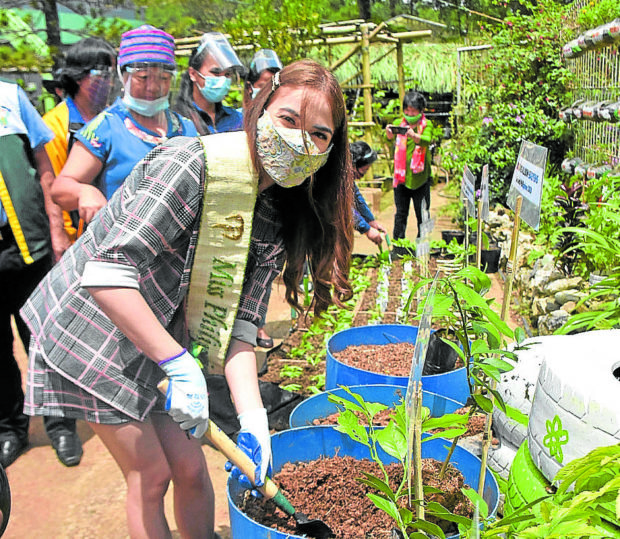
PLANT BEAUTY Reigning Miss Earth Philippines Roxanne Baeyens gets her hands dirty during a Sept. 3 tour of the Baguio Dairy Farm. —REDJIE CAWIS/PIA
BAGUIO CITY, Benguet, Philippines —Describing herself as having turned into a “certified ‘plantita’” during the coronavirus pandemic, reigning Miss Earth Philippines Roxanne Baeyens threw her “salakot” (native hat) behind the government’s “Plant, Plant, Plant” campaign during a recent tour of the Baguio Dairy Farm.
The urban gardening program, led by the Department of Agriculture (DA), popularizes backyard food production at the onset of the pandemic.
“I have been a strong advocate of urban gardening … inspired by my mother’s home garden,” said the 23-year-old Baguio resident.
Impact on ecology
But Baeyens said her passion was boosted by “the fast-paced urban development which phased out the trees in my beautiful city” and the jobs and livelihood lost due to the quarantine to respond to the health crisis.
She said the gardening strategy would harness idle lands, including family backyards, for food production to stimulate the farming industry and make urban communities food sufficient.
Urban gardening also has an impact on the ecology, Baeyens said, because rooftop farms absorb more carbon dioxide from a polluted atmosphere.
Growing food helps cure the imbalance that spawns the coronavirus, she said.
“The threat of a lack of food is as serious as the threat of the coronavirus itself,” said Cameron Odsey, the DA director in the Cordillera.
Odsey said the department’s immediate task was to encourage farmers to continue planting because beating the virus “requires sufficient and nutritious food to be available for everybody.”
Production of salad vegetables in Benguet province during the pandemic has not stopped.
Monthly projections after the Luzon lockdown in March showed a harvest of nearly 39,000 tons of cabbages, “pechay,” beans, potatoes and carrots, according to the DA.
Benguet supplies 80 percent of the salad vegetable demand in Metro Manila and some provinces in northern Luzon. Sales, however, dropped because markets like hotels, restaurants and groceries in major cities were forced to close due to the pandemic.
Vegetable prices plunged overnight, preventing food growers from recovering their investments.
Odsey said urban gardening would help cities that relied on imported food. Except for 14 villages here that grow vegetables and fruits, Baguio’s main food supplies come from Benguet and northern Luzon provinces.
—Vincent Cabreza